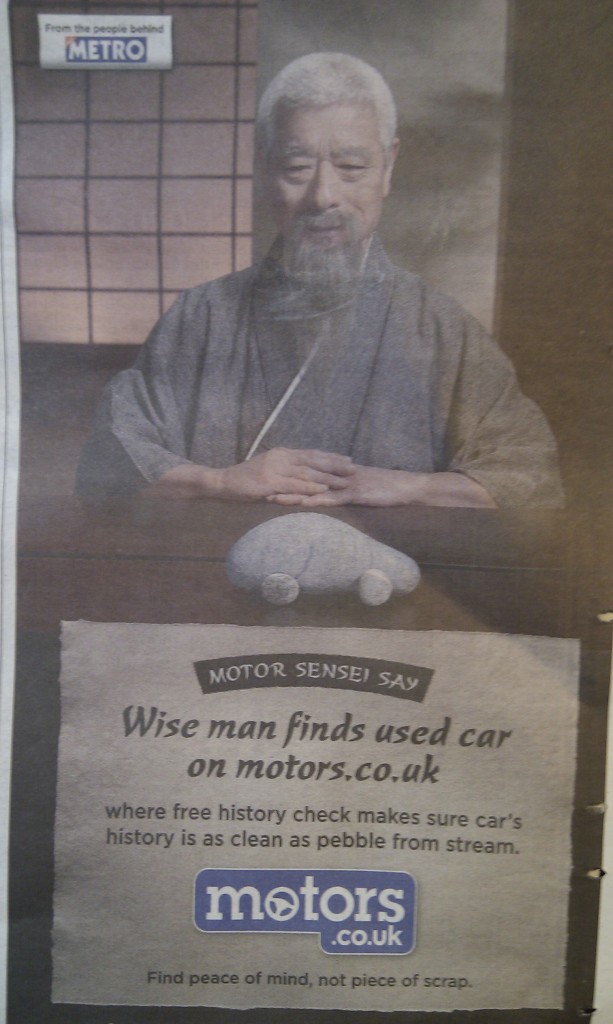Sebastian sent in this ad for a used car website that uses the stereotype of the wise Japanese “sensei”:
We’ve got all the elements: the wise older man in a robe, stylized letters similar to what Margaret Cho describes as “feng shui Hong Kong fooey font,” the broken English, the reference to nature (“clean as pebble from stream”).
Related posts: Asian enlightenment used to sell food, and more food.


Comments 24
C.L. Ward — June 27, 2010
Yoda follows the same formulaic construction.
macon d — June 27, 2010
We’ve got all the elements: the wise older man in a robe, stylized letters similar to what Margaret Cho describes as “feng shui Hong Kong fooey font,” the broken English, the reference to nature (“clean as pebble from stream”)
You could list "missing articles" there too.
adamson — June 27, 2010
This is disgusting.
I hate when advertisements do this... and especially with the phony "Asian"-type fonts. (Imagine those quotes around "Asian" are HUGE air quotes.)
MissPrism — June 28, 2010
This has only vague relevance, but in the UK "Asian" almost always means South Asian, eg Indian, Pakistani or Bangladeshi - we tend not to use it to mean Chinese, Japanese or Thai. If a shop is called an Asian Market, for example, it'll sell garam masala and chutneys, not soy sauce and tofu. We probably wouldn't call the Wise Sensei in that picture "Asian" even though that's geographically correct. I got the impression it was the other way round in the US, and when you say Asian you almost always mean East Asian - is that a reasonable assessment?
Ed — June 28, 2010
If the commentary had not said "wise Japanese "sensei"", I would have thought on my own of Chinese, specifically referencing the Hong Kong tradition of (B-movie) kung foo cinema. Certainly I know there are samurai films, but I don't think there are too many sensei in them (there are probably karate films besides the very American "Karate Kid", but I am not aware of them). I would have assumed the "special" relationship between the UK and HK would have more stereotype power than the relationship between England and Japan.
I am afraid I am not culturally literate enough to pick out from the ad any specific Chinese or Japanese elements, to be able to know the intended location, if there is one. Of course, the ad may simply be playing thoughtlessly on Asian stereotypes, which only makes the racism worse (and reminds me of the iceberg job). I gather "sensei" is perhaps a largely Japanese term, although it has Chinese equivalents. Margaret Cho's comments are quite clever and likely on target, but also contribute to viewing Japan/China/Korea as one amorphous mass.
I am not sure who came first, Splinter or Yoda (bearing in mind TMNT was a comic before it became a cartoon). But I am sure associating Yoda with this ad is something that would please the ad company (and I would tend to make that association). Riff-Trax, which is what the people who used to do Mystery Science Theatre 3000 do now, had a hilarious take on the Trade Federation as waiters in a Chinese restaurant.
That is interesting about the UK view of "Asian". In the US I guess we used to have an idea of "Near East", and possibly some idea of "South Asia". But geography is way out of favor around here, so most people just lump it all into Asia. Most people, although I suspect a fair number of Americans would regard Afghanistan, Pakistan and Bangladesh as Arab countries, right next to Iraq.
Jeff Kaufman — June 28, 2010
Motor Sensei also has a facebook page:
http://www.facebook.com/pages/Motor-Sensei/120381251307614
"Motor Sensei say thank you for looking at page. Where a good neighbour is a found treasure."